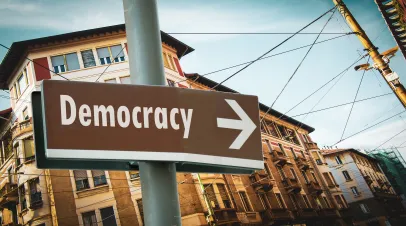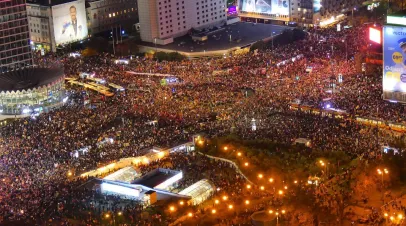Cities Fortifying Democracy
The Cities Fortifying Democracy project is a first-of-its-kind cohort of American and European cities working together in teams to collaborate on what cities do and can do to strengthen the foundation of democracy from the ground up.The collective trust that is essential to a vital democracy is built locally. Experiences with city government and the authenticity of community engagement are just part of what shapes individual attitudes about whether democracy works. For example, when cities actively engage residents to develop effective solutions to problems in transparent ways, the confidence generated helps create an ongoing dialogue that fosters innovation and a strong sense of community.
In the face of growing concerns over the strength of democracy worldwide, GMF has been working to identify how cities can fortify and further their underlying institutions and principles. Cities have a unique freedom to experiment with innovative approaches that can be replicated and scaled up to the state or national level. This has earned them a well-deserved reputation as “laboratories of democracy.” In this project, we will identify and explore some of the best of these local innovations to empower stakeholders around the world to strengthen democracy through agency and action at the city level.
Participating Cities
Expand AllAt A Glance
The project has 12 participating cities, six from the United States and six from Europe.

Participating Cities
To learn more about each of the cities, including participant bios, fast facts, and the city’s "democracy story," click on the links below.
Research Pillars
Expand AllGoverning
Government that is high-performing and ultimately trusted is critical to strengthening democracy. By definition, democracy is government of, by, and for the people. Critical to its strength, therefore, is that it be inclusive and transparent and that it continuously and creatively engage everyone. The smart use of technology, good participatory processes, innovative open data practices, and meaningful outreach to underrepresented groups are just some of the ways that cities can be true to democracy’s key values and build confidence in democratic governance.
Publications under this pillar:
Voting & Elections
Voting and elections are at the core of a well-functioning democracy. Cities, while not always directly in charge of these processes, are responsible for many critical aspects of elections (and the environment around them) that keep them free and fair. Guaranteeing freedom of speech and assembly, equitable and safe access to voting places, and facilitating participation of marginalized communities are just some of the ways that cities play a role in fortifying this aspect of democracy. Increased civic participation in all its forms makes democracy more resilient, whether in official elections, participatory processes, or neighborhood associations. Disaffection, disengagement, and low turnout, on the other hand, erode legitimacy and the incentives for elected officials to be responsive and accountable to all residents.
Publications under this pillar:
Public Safety & Justice
Effective and impartial enforcement of the rule of law is essential to a well-functioning democracy. Cities share responsibilities (not always directly) regarding the public safety of their residents, management of their police force, sound jurisprudence in their local courts, and mediation of local conflicts. Every day, city leaders are confronted with the consequences of crime, insecurity of residents, structural and systemic discrimination or marginalization, and the need to strike a balance between the freedoms and responsibilities important to a liberal democracy. For cities to remain vital and desirable, residents need to be safe and feel safe, to be themselves and express themselves fully regardless of their gender, race, ethnicity, sexual orientation, or age. It is the promise of strength in any democracy.
Local Journalism
Democracy only functions properly when voters can make informed political decisions. The revolutionary changes that have taken place, and that continue to evolve, in the information landscape have forced business models of media organizations to change and caused many local news outlets to disappear across both Europe and North America. While the internet has made national platforms, both mainstream and niche, into international platforms that are more accessible and popular, it has created a void of information and journalism at the local level. Consequently, residents can no longer stay well informed of the critical information needed to hold their local government and corporations fully accountable. They can also lack access to the stories and narratives that help build mutual understanding and solidarity in their community.
Nationally, political and policy developments are not interpreted through a local perspective and the inter-connectedness of local, national, and international news can be lost. Moreover, alienation is furthered among those not living in major cities, since their information landscape and local narratives can be dominated by perspectives or a culture that might be quite distinct from their daily lives.




